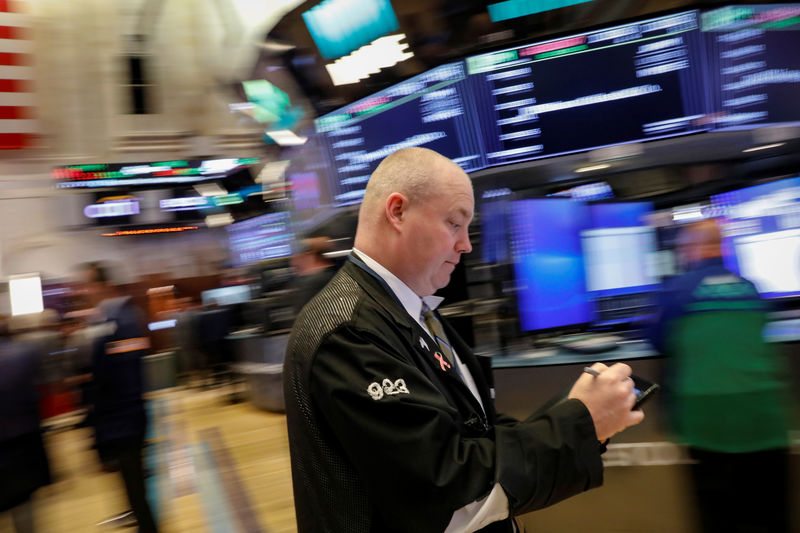By Ritvik Carvalho
LONDON (Reuters) - It's long been a financial market truism that if everyone already owns a particular stock, bond or security, there's no one left to buy and the only way for the price to go is down.
That's easy to assert, less easy to measure.
But a long-running and widely followed monthly survey of global investors by Bank of America Merrill Lynch (NYSE:BAC) has recently gained a reputation for accurately spotting where the herd is nearing a cliff edge.
Bank of America Merrill Lynch's fund manager survey polls several asset managers every month on various investment trends. Among the questions participants answer is what they consider to be the 'most crowded trade' in world markets.
Since the end of last year, the "most-crowded" trades featured in the survey have all unravelled in a short space of time following the poll's publication.
(For a graphic on 'Evolution of BAML Global Fund Manager Survey "most crowded trade" click https://reut.rs/2JUjCC0)
Take December for instance. The most-crowded trade according to the survey, published on December 19, was to go long, or buy and hold Bitcoin, the world's biggest cryptocurrency by market capitalization.
Bitcoin (BTC=BTSP) had soared to a record high of $19,666 by mid-December, before worries of a regulatory clampdown on cryptocurrency exchanges in January quickly deflated what many in the investment world were calling one of the biggest asset price bubbles in history.
(For a graphic on 'Bitcoin halves' click https://reut.rs/2JTFYTR)
The virtual currency now trades at less than half its peak value -- near the $8,000 mark.
In January, the most-crowded trade highlighted in the survey published on Jan. 16 was shorting, or selling volatility, which had sunk to historically low levels.
Soon after, higher than expected wage growth numbers in the United States prompted a big selloff in stocks and the VIX index (VIX), also known as Wall Street's "fear-gauge", posted its biggest one-day spike ever recorded. The VIX is a common proxy for expected stock market volatility.
The spike in the VIX caused major losses at exchange-traded funds (ETFs) or exchange-traded notes (ETNs), which bet on volatility remaining low. Some were forced to shut down.
(For a graphic on 'Short volatility products collapse as VIX spikes' click https://reut.rs/2ETYJ60)
UP NEXT: TECH?
For February, March and April, the most-crowded trade has been "Long FAANG + BAT", a reference to buying and holding the FAANG (Facebook (NASDAQ:FB), Amazon.com (NASDAQ:AMZN), Apple (NASDAQ:AAPL), Netflix (NASDAQ:NFLX), and Google's Alphabet (NASDAQ:GOOGL)) and BAT (LON:BATS) (Baidu, Alibaba (NYSE:BABA) and Tencent) groups of technology heavyweight stocks in the United States and China.
(For a graphic on 'Blunting FAANGs?' click https://reut.rs/2EUfuhj)
(For a graphic on 'BAT stocks: flying blind?' click https://reut.rs/2JTgTZA)
So when could that trade pop?
Manish Kabra, head of European equity and quant strategy at Bank of America Merrill Lynch, said it is not unusual for a particular asset class to spend months as a "crowded trade" on the survey.
"Sometimes it takes a bit of patience ... for what people say are crowded trades to become a contrarian trade. Historically we have seen, for instance, for almost six months people could say the same trades were crowded."
Kabra noted three instances in the past where there was a strong view to short emerging markets - those calls were followed by the start of a bull market in emerging markets in 2016.
There hasn't been a heavy shakeout in tech stocks yet but they have been rattled in recent weeks over a range of issues, especially increased regulatory scrutiny and the prospect of being caught up in a trade tussle between Washington and Beijing.
The survey shows funds have been overweight technology stocks for over a decade, raising questions about whether the sector is set to suffer the same fate as Bitcoin and short-vol products.
In the latest poll, 64 percent of investors said they would move to underweight on the sector if anti-trust, tax and privacy regulations ratcheted up.
So if soaring tech stocks are not next in line for a reversal, what could be? The most recent survey indicates the second most-crowded trade has been growing in conviction: shorting the U.S. dollar. Shorting the dollar has been the second most-crowded trade in the survey since February this year.

(For a graphic on 'BAML Global Fund Manager Survey April "most-crowded trade" results' click https://reut.rs/2ET3Aod)